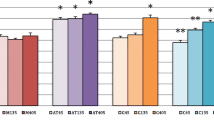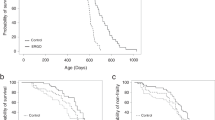Abstract
Metallic tin powder injected into Lewis rats caused marked enlargement of draining lymph nodes with prominent hyperplasia of plasma cells. A low level of dietary protein (8%) or deficiency of choline interfered with the cellular proliferation and reduced the size of the nodes by nearly onethird compared to a normal protein diet (20%). A high level of protein in the diet (50%) did not augment the effect of metallic tin powder beyond that achieved by a level usually considered adequate (20%).
Similar content being viewed by others
References
S. Levine and R. Sowinski, Plasmacellular lymphadenopathy produced in rats by tin, Exp. Mol. Pathol. 36, 86–98 (1982).
S. Levine and A. Saltzman, Metallic tin-induced lymphadenopathy in rat strains and hybrids, Biol. Trace Element Res. 52, 303–308 (1996).
S. Levine and R. Sowinski, Tin salts prevent the plasma cell response to metallic tin in Lewis rats, Toxicol. Appl. Pharmacol. 68, 110–115 (1983).
S. Levine and A. Saltzman, Tin compounds inhibit the plasma cell response to metallic tin: transfer of inhibition by parabiosis, Biol. Trace Element Res. 28, 165–172 (1991).
S. Levine and A. Saltzman, A method for evaluating regional effects of cytotoxic drugs on proliferating cells in lymph nodes, J. Pharmacol. Methods 17, 173–178 (1987).
S. Levine and A. Saltzman, Percutaneous inoculation of lymph nodes, J. Immunol. Methods 92, 227–230 (1986).
C. E. Slonecker and P. Osmanski, The effects of protein deficiency on acute inflammatory responses in rats, J. Reticuloend. Soc. 16, 239–251 (1974).
A. Aschkenasy, Protein deprivation induces a premitotic block in the lymphocytes of rats and primarily suppresses cortisone-sensitive T cells, Nutr. Rep. Int. 18, 177–185 (1978).
I. Malave, A. Nemeth, and M. Pocino, Changes in lymphocyte populations in proteincalorie deficient mice, Cell. Immunol. 49, 235–249 (1980).
R. G. Bell and L. A. Hazell, The influence of dietary protein insufficiency on the murine thymus. Evidence for an intrathymic pool of progenitor cells capable of thymus regeneration after severe atrophy, Aust. J. Exp. Biol. Med. Sci. 55, 571–584 (1977).
A. H. Rose, P. G. Holt, and K. J. Turner, The effect of a low protein diet on the immunogenic activity of murine peritoneal macrophages, International Archives Allergy & Applied Immunology 67, 356–361 (1982).
K. Schwarz, Recent dietary trace element research, exemplified by tin, fluorine and silicon, Fed. Proc. 33, 1748–1757 (1974).
Author information
Authors and Affiliations
Rights and permissions
About this article
Cite this article
Levine, S., Saltzman, A. Malnutrition interferes with the unique lymphadenopathy induced in lewis rats by metallic tin. Biol Trace Elem Res 85, 71–76 (2002). https://doi.org/10.1385/BTER:85:1:71
Received:
Revised:
Accepted:
Issue Date:
DOI: https://doi.org/10.1385/BTER:85:1:71




